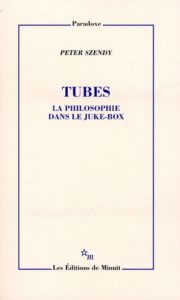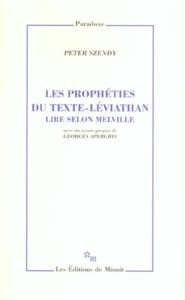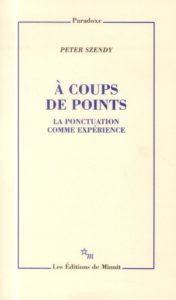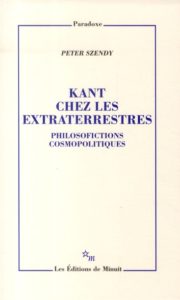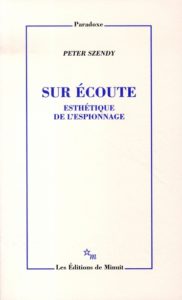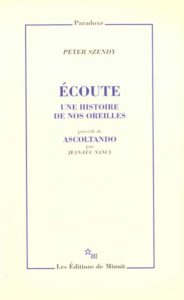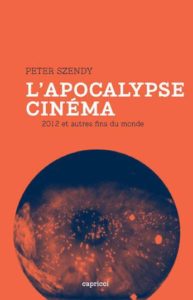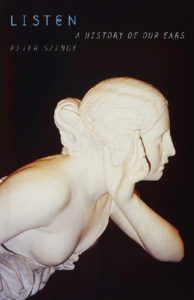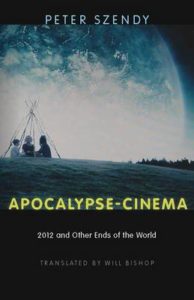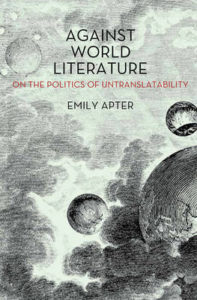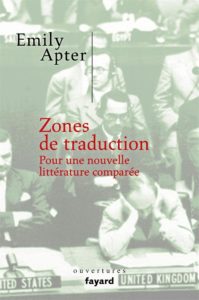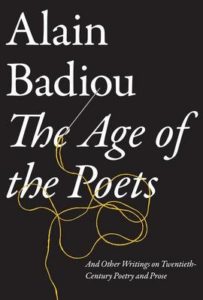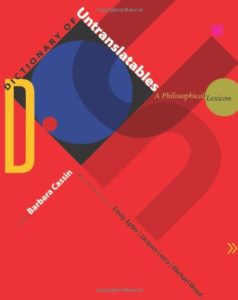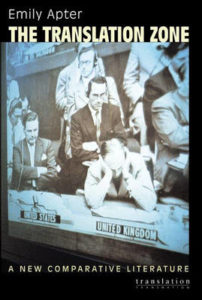Apocalypse-cinema
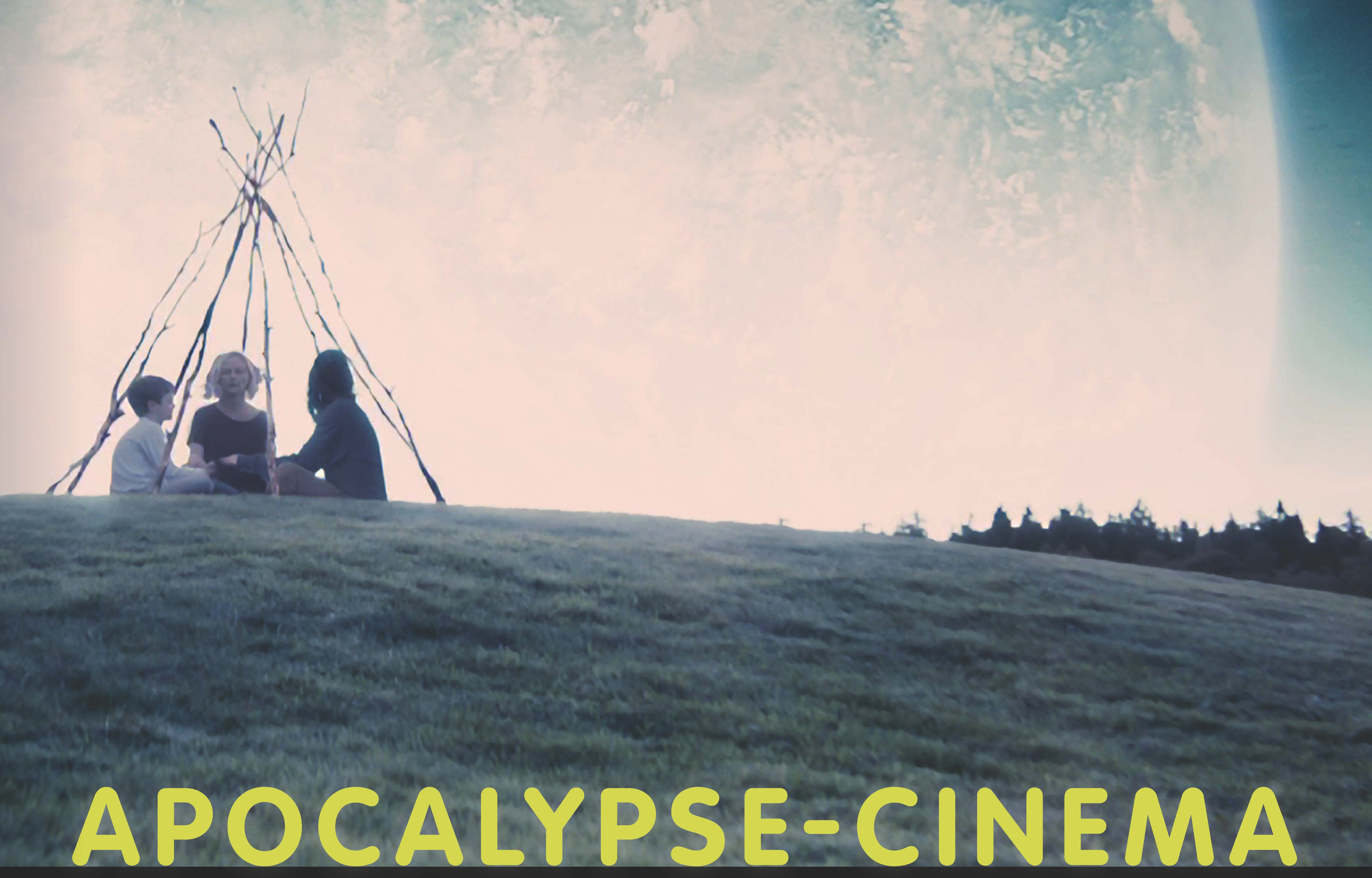
Looking at blockbuster movies that focus on general annihilation while also paying close attention to films like Melancholia, Cloverfield, Blade Runner, and Twelve Monkeys, Peter Szendy suggests, in Apocalypse-cinema, that in the apocalyptic genre, film gnaws at its own limit. Apocalyptic cinema is, at the same time and with the same double blow, the end of the world and the end of the film.
Joining Szendy for a conversation on the consummation and the (self-) consumption of cinema – in the form of an acinema that Lyotard evoked as the nihilistic horizon of filmic economy – will be Emily Apter. Our speakers will take on the apocalyptic genre not just as one genre among others, but as a reflection on the very conditions of possibility of cinema.
In English. Free and open to the public. No RSVP necessary.
Peter Szendy is a French philosopher and musicologist. He teaches at the Universite de Paris X (Nanterre) and is a consultant to IRCAM (Institut de Recherche et Coordination Acoustique/Musique), an organization that has been a pioneer in electroacoustic innovation and a mecca for contemporary music. Visiting Fellow at Princeton University in 2012, Szendy has also tought at Marc-Bloch University in Strasbourg from 1998 to 2005. He is the author of Écoute, une histoire de nos oreilles, Minuit, 2001, (Listen: A History of Our Ears, with a foreword by Jean-Luc Nancy, Fordham University Press, 2008); Membres fantômes, Minuit, 2002, (Phantom Limbs, Fordham University Press) Les Prophéties du texte – Léviathan, Minuit, 2004; (Prophecies of Leviathan: Reading Past Melville, with an afterword by Gil Anidjar, Fordham University Press, 2010); Sur écoute. Esthétique de l’espionnage, Minuit, 2007, Tubes (Hits. Philosophy in the Jukebox, Fordham University Press, 2011); Kant chez les extraterrestres, (Kant in the Land of Extraterrestrials: Cosmopolitical Philosofictions, Fordham University Press, 2013); À coups de points, (2013).
Emily Apter is Professor of French and Comparative Literature at New York University. Her books include: Against World Literature: On The Politics of Untranslatability (2013), The Translation Zone: A New Comparative Literature (2006), Continental Drift: From National Characters to Virtual Subjects (1999), Fetishism as Cultural Discourse, (co-edited with William Pietz in 1993), Feminizing the Fetish: Psychoanalysis and Narrative Obsession in Turn-of-the-Century France (1991), and André Gide and the Codes of Homotextuality (1987). In 2003-2004, Apter was a Guggenheim recipient, in 2011 she was awarded a Mellon Grant (with Jacques Lezra) for a seminar on The Problem of Translation and in 2012 she was appointed Remarque-Ecole Normale Supérieure Visiting Professor in Paris. A French translation of The Translation Zone: A New Comparative Literature is published by Fayard in the series Ouvertures edited by Barbara Cassin and Alain Badiou in 2014. She is currently at work on a new book: Unexceptional Politics: A Vocabulary of Obstruction for the Society of Calculation to come out soon.
"Yes, Kant did indeed speak of extraterrestrials." This phrase could provide the opening for this brief treatise of philosofiction (as one speaks of science fiction). What is revealed in the aliens of which Kant speaks-and he no doubt took them more seriously than anyone else in the history of... Learn More
"Yes, Kant did indeed speak of extraterrestrials." This phrase could provide the opening for this brief treatise of philosofiction (as one speaks of science fiction). What is revealed in the aliens of which Kant speaks-and he no doubt took them... Learn More
"Yes, Kant did indeed speak of extraterrestrials." This phrase could provide the opening for this brief treatise of philosofiction (as one speaks of science fiction). What is revealed in the... Learn More
C'est Boris Vian qui semble avoir inventé l'usage argotique du mot tube, pour désigner une chanson à succès. C'est-à-dire, le plus souvent, une chanson quelconque, qui ressemble à toutes les autres et qui chante volontiers sa banalité même. Or, ces mélodies, ces airs comme ça nous... Learn More
C'est Boris Vian qui semble avoir inventé l'usage argotique du mot tube, pour désigner une chanson à succès. C'est-à-dire, le plus souvent, une chanson quelconque, qui ressemble à toutes les autres et qui chante volontiers sa banalité... Learn More
C'est Boris Vian qui semble avoir inventé l'usage argotique du mot tube, pour désigner une chanson à succès. C'est-à-dire, le plus souvent, une chanson quelconque, qui ressemble à toutes les... Learn More
Moby Dick est peut-être avant tout un grand roman sur la lecture. Car le lecteur, quel qu'il soit, est déjà inclus, compris dans le texte. Toujours plus gonflé, ce livre-monstre, véritable Léviathan textuel, semble engloutir le monde et avaler jusqu'à celui qui l'ouvre, tel un nouveau... Learn More
Moby Dick est peut-être avant tout un grand roman sur la lecture. Car le lecteur, quel qu'il soit, est déjà inclus, compris dans le texte. Toujours plus gonflé, ce livre-monstre, véritable Léviathan textuel, semble engloutir le monde et... Learn More
Moby Dick est peut-être avant tout un grand roman sur la lecture. Car le lecteur, quel qu'il soit, est déjà inclus, compris dans le texte. Toujours plus gonflé, ce livre-monstre, véritable... Learn More
La ponctuation, on le sait, a une longue histoire, depuis les livres de comptes des scribes de l'Égypte antique jusqu'aux récents smileys. Tout en accordant la plus grande attention à l'art de ponctuer dans ses formes classiques ou contemporaines, ce livre voudrait toutefois ouvrir un champ... Learn More
La ponctuation, on le sait, a une longue histoire, depuis les livres de comptes des scribes de l'Égypte antique jusqu'aux récents smileys. Tout en accordant la plus grande attention à l'art de ponctuer dans ses formes classiques ou... Learn More
La ponctuation, on le sait, a une longue histoire, depuis les livres de comptes des scribes de l'Égypte antique jusqu'aux récents smileys. Tout en accordant la plus grande attention à l'art de... Learn More
" Kant, oui, a parlé des extraterrestres. " Ainsi pourrait s'ouvrir ce petit traité de philosofiction (comme on parle de science-fiction). Ce qu'il s'agit avant tout d'interroger, avec ces aliens que Kant a dû prendre au sérieux comme nul autre dans l'histoire de la philosophie, ce sont les... Learn More
" Kant, oui, a parlé des extraterrestres. " Ainsi pourrait s'ouvrir ce petit traité de philosofiction (comme on parle de science-fiction). Ce qu'il s'agit avant tout d'interroger, avec ces aliens que Kant a dû prendre au sérieux comme nul... Learn More
" Kant, oui, a parlé des extraterrestres. " Ainsi pourrait s'ouvrir ce petit traité de philosofiction (comme on parle de science-fiction). Ce qu'il s'agit avant tout d'interroger, avec ces... Learn More
L'actualité politique, nationale et internationale, ne cesse d'apporter son lot d'affaires et de scandales liés à ce qu'on appelle des écoutes : celles de l'Élysée, celles qui ont touché l'Onu au plus haut niveau... D'où vient cette surenchère de et dans l'écoute, d'où nous arrive... Learn More
L'actualité politique, nationale et internationale, ne cesse d'apporter son lot d'affaires et de scandales liés à ce qu'on appelle des écoutes : celles de l'Élysée, celles qui ont touché l'Onu au plus haut niveau... D'où vient cette... Learn More
L'actualité politique, nationale et internationale, ne cesse d'apporter son lot d'affaires et de scandales liés à ce qu'on appelle des écoutes : celles de l'Élysée, celles qui ont touché... Learn More
L'écoute est peut-être l'activité la plus discrète qui soit. C'est à peine une activité : une passivité, dit-on, une manière d'être affecté qui semble vouée à passer inaperçue. Quelqu'un qui écoute, ça ne s'entend pas. J'ai pourtant rêvé d'une archéologie de nos écoutes... Learn More
L'écoute est peut-être l'activité la plus discrète qui soit. C'est à peine une activité : une passivité, dit-on, une manière d'être affecté qui semble vouée à passer inaperçue. Quelqu'un qui écoute, ça ne s'entend pas. J'ai... Learn More
L'écoute est peut-être l'activité la plus discrète qui soit. C'est à peine une activité : une passivité, dit-on, une manière d'être affecté qui semble vouée à passer inaperçue.... Learn More
L'apocalypse-cinéma, ce n'est pas seulement la fin des temps sisouvent donnée à voir, à grand renfort d'effets spéciaux. Lephilosophe Peter Szendy avance l'hypothèse que c'est aussi sapropre limite que le cinéma travaille et affronte là : l'apocalypse-cinéma, c'est à la fois, d'un... Learn More
L'apocalypse-cinéma, ce n'est pas seulement la fin des temps sisouvent donnée à voir, à grand renfort d'effets spéciaux. Lephilosophe Peter Szendy avance l'hypothèse que c'est aussi sapropre limite que le cinéma travaille et affronte là :... Learn More
L'apocalypse-cinéma, ce n'est pas seulement la fin des temps sisouvent donnée à voir, à grand renfort d'effets spéciaux. Lephilosophe Peter Szendy avance l'hypothèse que c'est aussi sapropre... Learn More
In this intimate meditation on listening, Peter Szendy examines what the role of the listener is, and has been, through the centuries. The role of the composer is clear, as is the role of the musician, but where exactly does the listener stand in relation to the music s/he listens to? What is... Learn More
In this intimate meditation on listening, Peter Szendy examines what the role of the listener is, and has been, through the centuries. The role of the composer is clear, as is the role of the musician, but where exactly does the listener stand in... Learn More
In this intimate meditation on listening, Peter Szendy examines what the role of the listener is, and has been, through the centuries. The role of the composer is clear, as is the role of the... Learn More
Apocalypse-cinema is not only the end of time that has so often been staged as spectacle in films like 2012, The Day After Tomorrow, and The Terminator. By looking at blockbusters that play with general annihilation while also paying close attention to films like Melancholia, Cloverfield, Blade... Learn More
Apocalypse-cinema is not only the end of time that has so often been staged as spectacle in films like 2012, The Day After Tomorrow, and The Terminator. By looking at blockbusters that play with general annihilation while also paying close... Learn More
Apocalypse-cinema is not only the end of time that has so often been staged as spectacle in films like 2012, The Day After Tomorrow, and The Terminator. By looking at blockbusters that play with... Learn More
The book engages in a polemical critique of recent efforts to revive World Literature models of literary studies (Moretti, Casanova, etc) on the grounds that they construct their curricula on an assumption of translatability. As a result, incommensurability and what Apter calls the... Learn More
The book engages in a polemical critique of recent efforts to revive World Literature models of literary studies (Moretti, Casanova, etc) on the grounds that they construct their curricula on an assumption of translatability. As a result,... Learn More
The book engages in a polemical critique of recent efforts to revive World Literature models of literary studies (Moretti, Casanova, etc) on the grounds that they construct their curricula on an... Learn More
Cette spécialiste de la littérature comparée et du français à la New York University étudie les rapports de force entre les langues en s'appuyant sur l'histoire et, face à l'uniformisation des langues, défend le droit de ne pas traduire certains termes sans, pour autant, renoncer à les... Learn More
Cette spécialiste de la littérature comparée et du français à la New York University étudie les rapports de force entre les langues en s'appuyant sur l'histoire et, face à l'uniformisation des langues, défend le droit de ne pas traduire... Learn More
Cette spécialiste de la littérature comparée et du français à la New York University étudie les rapports de force entre les langues en s'appuyant sur l'histoire et, face à l'uniformisation... Learn More
In this collection of essays, Alain Badiou revisits the age-old problem of the relation between literature and philosophy, arguing against both Plato and Heidegger's famous arguments. Philosophy neither has to ban the poets from the republic nor abdicate its own powers to the sole benefit of... Learn More
In this collection of essays, Alain Badiou revisits the age-old problem of the relation between literature and philosophy, arguing against both Plato and Heidegger's famous arguments. Philosophy neither has to ban the poets from the republic nor... Learn More
In this collection of essays, Alain Badiou revisits the age-old problem of the relation between literature and philosophy, arguing against both Plato and Heidegger's famous arguments. Philosophy... Learn More
This is an encyclopedic dictionary of close to 400 important philosophical, literary, and political terms and concepts that defy easy--or any--translation from one language and culture to another. Drawn from more than a dozen languages, terms such as Dasein (German), pravda (Russian), saudade... Learn More
This is an encyclopedic dictionary of close to 400 important philosophical, literary, and political terms and concepts that defy easy--or any--translation from one language and culture to another. Drawn from more than a dozen languages, terms... Learn More
This is an encyclopedic dictionary of close to 400 important philosophical, literary, and political terms and concepts that defy easy--or any--translation from one language and culture to another.... Learn More
Translation, before 9/11, was deemed primarily an instrument of international relations, business, education, and culture. Today it seems, more than ever, a matter of war and peace. In The Translation Zone, Emily Apter argues that the field of translation studies, habitually confined to a... Learn More
Translation, before 9/11, was deemed primarily an instrument of international relations, business, education, and culture. Today it seems, more than ever, a matter of war and peace. In The Translation Zone, Emily Apter argues that the field of... Learn More
Translation, before 9/11, was deemed primarily an instrument of international relations, business, education, and culture. Today it seems, more than ever, a matter of war and peace. In The... Learn More
"Yes, Kant did indeed speak of extraterrestrials." This phrase could provide the opening for this brief treatise of philosofiction (as one speaks of science fiction). What is revealed in the aliens of which Kant speaks-and he no doubt took them more seriously than anyone else in the history of... Learn More
"Yes, Kant did indeed speak of extraterrestrials." This phrase could provide the opening for this brief treatise of philosofiction (as one speaks of science fiction). What is revealed in the aliens of which Kant speaks-and he no doubt took them... Learn More
"Yes, Kant did indeed speak of extraterrestrials." This phrase could provide the opening for this brief treatise of philosofiction (as one speaks of science fiction). What is revealed in the... Learn More
C'est Boris Vian qui semble avoir inventé l'usage argotique du mot tube, pour désigner une chanson à succès. C'est-à-dire, le plus souvent, une chanson quelconque, qui ressemble à toutes les autres et qui chante volontiers sa banalité même. Or, ces mélodies, ces airs comme ça nous... Learn More
C'est Boris Vian qui semble avoir inventé l'usage argotique du mot tube, pour désigner une chanson à succès. C'est-à-dire, le plus souvent, une chanson quelconque, qui ressemble à toutes les autres et qui chante volontiers sa banalité... Learn More
C'est Boris Vian qui semble avoir inventé l'usage argotique du mot tube, pour désigner une chanson à succès. C'est-à-dire, le plus souvent, une chanson quelconque, qui ressemble à toutes les... Learn More
Moby Dick est peut-être avant tout un grand roman sur la lecture. Car le lecteur, quel qu'il soit, est déjà inclus, compris dans le texte. Toujours plus gonflé, ce livre-monstre, véritable Léviathan textuel, semble engloutir le monde et avaler jusqu'à celui qui l'ouvre, tel un nouveau... Learn More
Moby Dick est peut-être avant tout un grand roman sur la lecture. Car le lecteur, quel qu'il soit, est déjà inclus, compris dans le texte. Toujours plus gonflé, ce livre-monstre, véritable Léviathan textuel, semble engloutir le monde et... Learn More
Moby Dick est peut-être avant tout un grand roman sur la lecture. Car le lecteur, quel qu'il soit, est déjà inclus, compris dans le texte. Toujours plus gonflé, ce livre-monstre, véritable... Learn More
La ponctuation, on le sait, a une longue histoire, depuis les livres de comptes des scribes de l'Égypte antique jusqu'aux récents smileys. Tout en accordant la plus grande attention à l'art de ponctuer dans ses formes classiques ou contemporaines, ce livre voudrait toutefois ouvrir un champ... Learn More
La ponctuation, on le sait, a une longue histoire, depuis les livres de comptes des scribes de l'Égypte antique jusqu'aux récents smileys. Tout en accordant la plus grande attention à l'art de ponctuer dans ses formes classiques ou... Learn More
La ponctuation, on le sait, a une longue histoire, depuis les livres de comptes des scribes de l'Égypte antique jusqu'aux récents smileys. Tout en accordant la plus grande attention à l'art de... Learn More
" Kant, oui, a parlé des extraterrestres. " Ainsi pourrait s'ouvrir ce petit traité de philosofiction (comme on parle de science-fiction). Ce qu'il s'agit avant tout d'interroger, avec ces aliens que Kant a dû prendre au sérieux comme nul autre dans l'histoire de la philosophie, ce sont les... Learn More
" Kant, oui, a parlé des extraterrestres. " Ainsi pourrait s'ouvrir ce petit traité de philosofiction (comme on parle de science-fiction). Ce qu'il s'agit avant tout d'interroger, avec ces aliens que Kant a dû prendre au sérieux comme nul... Learn More
" Kant, oui, a parlé des extraterrestres. " Ainsi pourrait s'ouvrir ce petit traité de philosofiction (comme on parle de science-fiction). Ce qu'il s'agit avant tout d'interroger, avec ces... Learn More
L'actualité politique, nationale et internationale, ne cesse d'apporter son lot d'affaires et de scandales liés à ce qu'on appelle des écoutes : celles de l'Élysée, celles qui ont touché l'Onu au plus haut niveau... D'où vient cette surenchère de et dans l'écoute, d'où nous arrive... Learn More
L'actualité politique, nationale et internationale, ne cesse d'apporter son lot d'affaires et de scandales liés à ce qu'on appelle des écoutes : celles de l'Élysée, celles qui ont touché l'Onu au plus haut niveau... D'où vient cette... Learn More
L'actualité politique, nationale et internationale, ne cesse d'apporter son lot d'affaires et de scandales liés à ce qu'on appelle des écoutes : celles de l'Élysée, celles qui ont touché... Learn More
L'écoute est peut-être l'activité la plus discrète qui soit. C'est à peine une activité : une passivité, dit-on, une manière d'être affecté qui semble vouée à passer inaperçue. Quelqu'un qui écoute, ça ne s'entend pas. J'ai pourtant rêvé d'une archéologie de nos écoutes... Learn More
L'écoute est peut-être l'activité la plus discrète qui soit. C'est à peine une activité : une passivité, dit-on, une manière d'être affecté qui semble vouée à passer inaperçue. Quelqu'un qui écoute, ça ne s'entend pas. J'ai... Learn More
L'écoute est peut-être l'activité la plus discrète qui soit. C'est à peine une activité : une passivité, dit-on, une manière d'être affecté qui semble vouée à passer inaperçue.... Learn More
L'apocalypse-cinéma, ce n'est pas seulement la fin des temps sisouvent donnée à voir, à grand renfort d'effets spéciaux. Lephilosophe Peter Szendy avance l'hypothèse que c'est aussi sapropre limite que le cinéma travaille et affronte là : l'apocalypse-cinéma, c'est à la fois, d'un... Learn More
L'apocalypse-cinéma, ce n'est pas seulement la fin des temps sisouvent donnée à voir, à grand renfort d'effets spéciaux. Lephilosophe Peter Szendy avance l'hypothèse que c'est aussi sapropre limite que le cinéma travaille et affronte là :... Learn More
L'apocalypse-cinéma, ce n'est pas seulement la fin des temps sisouvent donnée à voir, à grand renfort d'effets spéciaux. Lephilosophe Peter Szendy avance l'hypothèse que c'est aussi sapropre... Learn More
In this intimate meditation on listening, Peter Szendy examines what the role of the listener is, and has been, through the centuries. The role of the composer is clear, as is the role of the musician, but where exactly does the listener stand in relation to the music s/he listens to? What is... Learn More
In this intimate meditation on listening, Peter Szendy examines what the role of the listener is, and has been, through the centuries. The role of the composer is clear, as is the role of the musician, but where exactly does the listener stand in... Learn More
In this intimate meditation on listening, Peter Szendy examines what the role of the listener is, and has been, through the centuries. The role of the composer is clear, as is the role of the... Learn More
Apocalypse-cinema is not only the end of time that has so often been staged as spectacle in films like 2012, The Day After Tomorrow, and The Terminator. By looking at blockbusters that play with general annihilation while also paying close attention to films like Melancholia, Cloverfield, Blade... Learn More
Apocalypse-cinema is not only the end of time that has so often been staged as spectacle in films like 2012, The Day After Tomorrow, and The Terminator. By looking at blockbusters that play with general annihilation while also paying close... Learn More
Apocalypse-cinema is not only the end of time that has so often been staged as spectacle in films like 2012, The Day After Tomorrow, and The Terminator. By looking at blockbusters that play with... Learn More
The book engages in a polemical critique of recent efforts to revive World Literature models of literary studies (Moretti, Casanova, etc) on the grounds that they construct their curricula on an assumption of translatability. As a result, incommensurability and what Apter calls the... Learn More
The book engages in a polemical critique of recent efforts to revive World Literature models of literary studies (Moretti, Casanova, etc) on the grounds that they construct their curricula on an assumption of translatability. As a result,... Learn More
The book engages in a polemical critique of recent efforts to revive World Literature models of literary studies (Moretti, Casanova, etc) on the grounds that they construct their curricula on an... Learn More
Cette spécialiste de la littérature comparée et du français à la New York University étudie les rapports de force entre les langues en s'appuyant sur l'histoire et, face à l'uniformisation des langues, défend le droit de ne pas traduire certains termes sans, pour autant, renoncer à les... Learn More
Cette spécialiste de la littérature comparée et du français à la New York University étudie les rapports de force entre les langues en s'appuyant sur l'histoire et, face à l'uniformisation des langues, défend le droit de ne pas traduire... Learn More
Cette spécialiste de la littérature comparée et du français à la New York University étudie les rapports de force entre les langues en s'appuyant sur l'histoire et, face à l'uniformisation... Learn More
In this collection of essays, Alain Badiou revisits the age-old problem of the relation between literature and philosophy, arguing against both Plato and Heidegger's famous arguments. Philosophy neither has to ban the poets from the republic nor abdicate its own powers to the sole benefit of... Learn More
In this collection of essays, Alain Badiou revisits the age-old problem of the relation between literature and philosophy, arguing against both Plato and Heidegger's famous arguments. Philosophy neither has to ban the poets from the republic nor... Learn More
In this collection of essays, Alain Badiou revisits the age-old problem of the relation between literature and philosophy, arguing against both Plato and Heidegger's famous arguments. Philosophy... Learn More
This is an encyclopedic dictionary of close to 400 important philosophical, literary, and political terms and concepts that defy easy--or any--translation from one language and culture to another. Drawn from more than a dozen languages, terms such as Dasein (German), pravda (Russian), saudade... Learn More
This is an encyclopedic dictionary of close to 400 important philosophical, literary, and political terms and concepts that defy easy--or any--translation from one language and culture to another. Drawn from more than a dozen languages, terms... Learn More
This is an encyclopedic dictionary of close to 400 important philosophical, literary, and political terms and concepts that defy easy--or any--translation from one language and culture to another.... Learn More
Translation, before 9/11, was deemed primarily an instrument of international relations, business, education, and culture. Today it seems, more than ever, a matter of war and peace. In The Translation Zone, Emily Apter argues that the field of translation studies, habitually confined to a... Learn More
Translation, before 9/11, was deemed primarily an instrument of international relations, business, education, and culture. Today it seems, more than ever, a matter of war and peace. In The Translation Zone, Emily Apter argues that the field of... Learn More
Translation, before 9/11, was deemed primarily an instrument of international relations, business, education, and culture. Today it seems, more than ever, a matter of war and peace. In The... Learn More
"Yes, Kant did indeed speak of extraterrestrials." This phrase could provide the opening for this brief treatise of philosofiction (as one speaks of science fiction). What is revealed in the aliens of which Kant speaks-and he no doubt took them more seriously than anyone else in the history of... Learn More
"Yes, Kant did indeed speak of extraterrestrials." This phrase could provide the opening for this brief treatise of philosofiction (as one speaks of science fiction). What is revealed in the aliens of which Kant speaks-and he no doubt took them... Learn More
"Yes, Kant did indeed speak of extraterrestrials." This phrase could provide the opening for this brief treatise of philosofiction (as one speaks of science fiction). What is revealed in the... Learn More
C'est Boris Vian qui semble avoir inventé l'usage argotique du mot tube, pour désigner une chanson à succès. C'est-à-dire, le plus souvent, une chanson quelconque, qui ressemble à toutes les autres et qui chante volontiers sa banalité même. Or, ces mélodies, ces airs comme ça nous... Learn More
C'est Boris Vian qui semble avoir inventé l'usage argotique du mot tube, pour désigner une chanson à succès. C'est-à-dire, le plus souvent, une chanson quelconque, qui ressemble à toutes les autres et qui chante volontiers sa banalité... Learn More
C'est Boris Vian qui semble avoir inventé l'usage argotique du mot tube, pour désigner une chanson à succès. C'est-à-dire, le plus souvent, une chanson quelconque, qui ressemble à toutes les... Learn More
Moby Dick est peut-être avant tout un grand roman sur la lecture. Car le lecteur, quel qu'il soit, est déjà inclus, compris dans le texte. Toujours plus gonflé, ce livre-monstre, véritable Léviathan textuel, semble engloutir le monde et avaler jusqu'à celui qui l'ouvre, tel un nouveau... Learn More
Moby Dick est peut-être avant tout un grand roman sur la lecture. Car le lecteur, quel qu'il soit, est déjà inclus, compris dans le texte. Toujours plus gonflé, ce livre-monstre, véritable Léviathan textuel, semble engloutir le monde et... Learn More
Moby Dick est peut-être avant tout un grand roman sur la lecture. Car le lecteur, quel qu'il soit, est déjà inclus, compris dans le texte. Toujours plus gonflé, ce livre-monstre, véritable... Learn More
La ponctuation, on le sait, a une longue histoire, depuis les livres de comptes des scribes de l'Égypte antique jusqu'aux récents smileys. Tout en accordant la plus grande attention à l'art de ponctuer dans ses formes classiques ou contemporaines, ce livre voudrait toutefois ouvrir un champ... Learn More
La ponctuation, on le sait, a une longue histoire, depuis les livres de comptes des scribes de l'Égypte antique jusqu'aux récents smileys. Tout en accordant la plus grande attention à l'art de ponctuer dans ses formes classiques ou... Learn More
La ponctuation, on le sait, a une longue histoire, depuis les livres de comptes des scribes de l'Égypte antique jusqu'aux récents smileys. Tout en accordant la plus grande attention à l'art de... Learn More
" Kant, oui, a parlé des extraterrestres. " Ainsi pourrait s'ouvrir ce petit traité de philosofiction (comme on parle de science-fiction). Ce qu'il s'agit avant tout d'interroger, avec ces aliens que Kant a dû prendre au sérieux comme nul autre dans l'histoire de la philosophie, ce sont les... Learn More
" Kant, oui, a parlé des extraterrestres. " Ainsi pourrait s'ouvrir ce petit traité de philosofiction (comme on parle de science-fiction). Ce qu'il s'agit avant tout d'interroger, avec ces aliens que Kant a dû prendre au sérieux comme nul... Learn More
" Kant, oui, a parlé des extraterrestres. " Ainsi pourrait s'ouvrir ce petit traité de philosofiction (comme on parle de science-fiction). Ce qu'il s'agit avant tout d'interroger, avec ces... Learn More
L'actualité politique, nationale et internationale, ne cesse d'apporter son lot d'affaires et de scandales liés à ce qu'on appelle des écoutes : celles de l'Élysée, celles qui ont touché l'Onu au plus haut niveau... D'où vient cette surenchère de et dans l'écoute, d'où nous arrive... Learn More
L'actualité politique, nationale et internationale, ne cesse d'apporter son lot d'affaires et de scandales liés à ce qu'on appelle des écoutes : celles de l'Élysée, celles qui ont touché l'Onu au plus haut niveau... D'où vient cette... Learn More
L'actualité politique, nationale et internationale, ne cesse d'apporter son lot d'affaires et de scandales liés à ce qu'on appelle des écoutes : celles de l'Élysée, celles qui ont touché... Learn More
L'écoute est peut-être l'activité la plus discrète qui soit. C'est à peine une activité : une passivité, dit-on, une manière d'être affecté qui semble vouée à passer inaperçue. Quelqu'un qui écoute, ça ne s'entend pas. J'ai pourtant rêvé d'une archéologie de nos écoutes... Learn More
L'écoute est peut-être l'activité la plus discrète qui soit. C'est à peine une activité : une passivité, dit-on, une manière d'être affecté qui semble vouée à passer inaperçue. Quelqu'un qui écoute, ça ne s'entend pas. J'ai... Learn More
L'écoute est peut-être l'activité la plus discrète qui soit. C'est à peine une activité : une passivité, dit-on, une manière d'être affecté qui semble vouée à passer inaperçue.... Learn More
L'apocalypse-cinéma, ce n'est pas seulement la fin des temps sisouvent donnée à voir, à grand renfort d'effets spéciaux. Lephilosophe Peter Szendy avance l'hypothèse que c'est aussi sapropre limite que le cinéma travaille et affronte là : l'apocalypse-cinéma, c'est à la fois, d'un... Learn More
L'apocalypse-cinéma, ce n'est pas seulement la fin des temps sisouvent donnée à voir, à grand renfort d'effets spéciaux. Lephilosophe Peter Szendy avance l'hypothèse que c'est aussi sapropre limite que le cinéma travaille et affronte là :... Learn More
L'apocalypse-cinéma, ce n'est pas seulement la fin des temps sisouvent donnée à voir, à grand renfort d'effets spéciaux. Lephilosophe Peter Szendy avance l'hypothèse que c'est aussi sapropre... Learn More
In this intimate meditation on listening, Peter Szendy examines what the role of the listener is, and has been, through the centuries. The role of the composer is clear, as is the role of the musician, but where exactly does the listener stand in relation to the music s/he listens to? What is... Learn More
In this intimate meditation on listening, Peter Szendy examines what the role of the listener is, and has been, through the centuries. The role of the composer is clear, as is the role of the musician, but where exactly does the listener stand in... Learn More
In this intimate meditation on listening, Peter Szendy examines what the role of the listener is, and has been, through the centuries. The role of the composer is clear, as is the role of the... Learn More
Apocalypse-cinema is not only the end of time that has so often been staged as spectacle in films like 2012, The Day After Tomorrow, and The Terminator. By looking at blockbusters that play with general annihilation while also paying close attention to films like Melancholia, Cloverfield, Blade... Learn More
Apocalypse-cinema is not only the end of time that has so often been staged as spectacle in films like 2012, The Day After Tomorrow, and The Terminator. By looking at blockbusters that play with general annihilation while also paying close... Learn More
Apocalypse-cinema is not only the end of time that has so often been staged as spectacle in films like 2012, The Day After Tomorrow, and The Terminator. By looking at blockbusters that play with... Learn More
The book engages in a polemical critique of recent efforts to revive World Literature models of literary studies (Moretti, Casanova, etc) on the grounds that they construct their curricula on an assumption of translatability. As a result, incommensurability and what Apter calls the... Learn More
The book engages in a polemical critique of recent efforts to revive World Literature models of literary studies (Moretti, Casanova, etc) on the grounds that they construct their curricula on an assumption of translatability. As a result,... Learn More
The book engages in a polemical critique of recent efforts to revive World Literature models of literary studies (Moretti, Casanova, etc) on the grounds that they construct their curricula on an... Learn More
Cette spécialiste de la littérature comparée et du français à la New York University étudie les rapports de force entre les langues en s'appuyant sur l'histoire et, face à l'uniformisation des langues, défend le droit de ne pas traduire certains termes sans, pour autant, renoncer à les... Learn More
Cette spécialiste de la littérature comparée et du français à la New York University étudie les rapports de force entre les langues en s'appuyant sur l'histoire et, face à l'uniformisation des langues, défend le droit de ne pas traduire... Learn More
Cette spécialiste de la littérature comparée et du français à la New York University étudie les rapports de force entre les langues en s'appuyant sur l'histoire et, face à l'uniformisation... Learn More
In this collection of essays, Alain Badiou revisits the age-old problem of the relation between literature and philosophy, arguing against both Plato and Heidegger's famous arguments. Philosophy neither has to ban the poets from the republic nor abdicate its own powers to the sole benefit of... Learn More
In this collection of essays, Alain Badiou revisits the age-old problem of the relation between literature and philosophy, arguing against both Plato and Heidegger's famous arguments. Philosophy neither has to ban the poets from the republic nor... Learn More
In this collection of essays, Alain Badiou revisits the age-old problem of the relation between literature and philosophy, arguing against both Plato and Heidegger's famous arguments. Philosophy... Learn More
This is an encyclopedic dictionary of close to 400 important philosophical, literary, and political terms and concepts that defy easy--or any--translation from one language and culture to another. Drawn from more than a dozen languages, terms such as Dasein (German), pravda (Russian), saudade... Learn More
This is an encyclopedic dictionary of close to 400 important philosophical, literary, and political terms and concepts that defy easy--or any--translation from one language and culture to another. Drawn from more than a dozen languages, terms... Learn More
This is an encyclopedic dictionary of close to 400 important philosophical, literary, and political terms and concepts that defy easy--or any--translation from one language and culture to another.... Learn More
Translation, before 9/11, was deemed primarily an instrument of international relations, business, education, and culture. Today it seems, more than ever, a matter of war and peace. In The Translation Zone, Emily Apter argues that the field of translation studies, habitually confined to a... Learn More
Translation, before 9/11, was deemed primarily an instrument of international relations, business, education, and culture. Today it seems, more than ever, a matter of war and peace. In The Translation Zone, Emily Apter argues that the field of... Learn More
Translation, before 9/11, was deemed primarily an instrument of international relations, business, education, and culture. Today it seems, more than ever, a matter of war and peace. In The... Learn More



